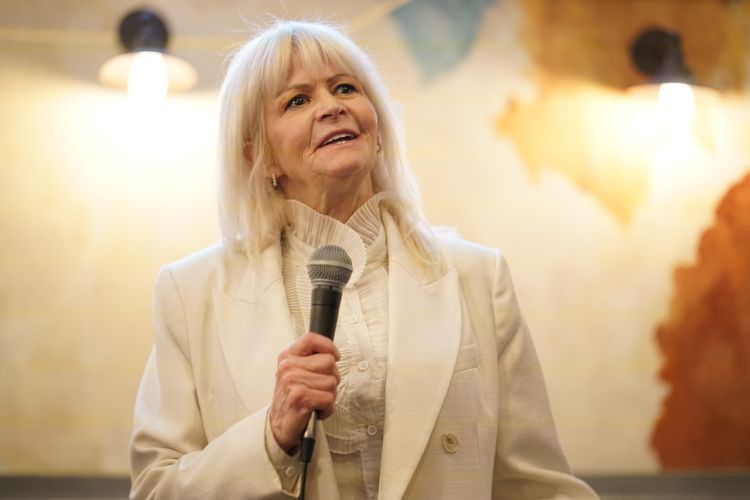Patrick Fitzgerald in the role of Dr. Noël Browne in “Rebel in the Soul” at the Irish Rep.
PHOTO BY CAROL ROSEGG
By Orla O’Sullivan
“He’s part of our collective Irish memory, but a lot of people don’t know why,” said Patrick Fitzgerald of Dr. Noël Browne, a legendary figure in Irish politics he is now playing on stage at the Irish Repertory Theatre.
Fitzgerald, a native of Cork City, counts himself among those who had, when it came down to it, only a nodding acquaintance with Browne, the subject of Larry Kirwan’s latest play, “Rebel in the Soul.” Before he primed himself to play the politician by reading three books about him—including Browne’s own tellingly titled “Against The Tide”—Fitzgerald said he knew the basics.
“I knew he introduced the Mother and Child Scheme, that his mother had died from TB, and that, ultimately, thanks to him, [free] medical cards were provided to all poor people,” Fitzgerald said.
The biggest surprise in researching the role was how very poor Browne himself had been. “This was a very finely spoken, erudite man,” Fitzgerald said. In fact, he was known as Flash, presumably not just for the speed with which he moved as a legislator, but also for the sports cars he favored. But the actor experienced a certain cognitive dissonance when he discovered the family had been “beggars on the streets of London.”
The play opens at a pivotal point in Browne’s budding parliamentary career, a couple of years after his 1948 election to the Dáil at age 33 and his appointment as minister for health in the multi-party coalition government. As minister, Browne is determined to do whatever it takes to rid Ireland of the scourge of tuberculosis, which devastated his family and almost killed him.
It was the second major policy that set up a clash in which the handsome, arrogant upstart from County Waterford appeared to have underestimate his opponents. Proposing free healthcare for pregnant women and their offspring up to age 16 put Browne at odds with two immensely powerful figures, Archbishop Dr. John Charles McQuaid and Seán MacBride, the leader of Browne’s party Clann na Poblachta. McQuaid disliked the idea of free healthcare and feared liberal family planning, while MacBride considered it a distraction from his main goal of a united Ireland.
Awaiting the archbishop at his Dublin residence, Browne thinks back on how far he has come, but he’s on the brink of his political downfall. The controversy will bring down the government of the day and lead to Browne’s ouster from his party—the first of many, as he ultimately represented five in the Dáil.
“He kept getting elected until he didn’t want to and then he went off to Connemara and played the squeeze-box,” Fitzgerald said. Browne died 20 years ago this month, at age 81. “He never achieved as much later on, but when he spoke, people listened.
“He was definitely a progressive and later became a campaigner for human rights and women’s rights,” he added.
Fitzgerald said he “absolutely” identifies with the character, “his principles and human voice”—far more important to Browne than what he called “smothering theocracies.” (In that, Browne echoes another hero of Fitzgerald’s, James Joyce, whose work he staged at the Rep and in Dublin, in “Gibraltar,” based on “Ulysses.” He’s now hoping to become the first to professionally record “Finnegans Wake” in its entirety.)
The actor noted that although Browne was himself raised Catholic, his outlook was threatening to a powerful Catholic leader like McQuaid. Browne attended Catholic boarding schools in Britain and Trinity College Dublin, then still decried by the bishops as an immoral Protestant establishment. Also, he married a Protestant, Phyllis Harrison (played here by Sarah Street).
Browne’s lucky break came when he wound up in a boarding school, where a relative of his mother’s worked. As a young child, Browne lost two siblings to TB, then his father and along with him the family home. His mother succumbed a couple of years later and her remaining children went into care.
At a subsequent boarding school, Browne befriended someone from an influential family—appropriately named Chance—and it was they who paid for him to become a doctor.
How Fitzgerald chanced to be Browne began 29 years ago when he played in the Rep’s first production, “The Plough and the Stars.” The Blackrock, Cork, native came to New York after college in 1984. “I missed law by half a point, otherwise I might have stayed in Ireland,” he recalled. Last at the Rep starring in “Sea Marks,” Fitzgerald said he “couldn’t resist” the offer to play Noël Browne.
His stellar adversaries include Rep regulars John Keating as the ruthless tactician McQuaid, who was archbishop of Dublin from 1940 through his death in 1972, and Sean Gormley as the complex MacBride, who resigned from the IRA after the new Irish Constitution was enacted in 1937, went on to help found Amnesty International in 1961 and to win the Nobel Peace Prize and the Lenin Peace Prize in the 1970s.
“Rebel in the Soul” by Larry Kirwan, directed by Charlotte Moore, with Patrick Fitzgerald in the lead role, runs to May 21 at the Irish Repertory Theatre, 132 West 22nd St., Manhattan. Tickets from irishrep.org or 212-727-2737.









